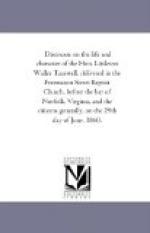It is known that Mr. Pinkney was engaged for the appellants; and much interest was excited at the approaching contest between two men whose peculiar province was the law of admiralty; but before the appointed time, Pinkney was summoned to another and higher tribunal; and among those who deplored the loss which our whole country suffered in his death, none was more sincere than Mr. Tazewell. A friend, who had heard the current rumors concerning the death of Pinkney in connexion with the case, ventured to ask Mr. Tazewell about the truth of the matter. He instantly said that it was all a fiction,—that Pinkney, who was of a full temperament, died of an inflammatory disease (as we all know from his life by Wheaton); that there were no extremely difficult points in the case, and that, if there had been, Pinkney feared the face of no man living. Of Mr. Tazewell, intellectually and physically as he appeared at this time, an eloquent likeness is presented in the sketch of Francis Walker Gilmer.[5]
Tazewell had argued the Cochineal case in Norfolk and in Richmond before it reached the Supreme Court, and had exhibited such an abounding wealth of argument, it was believed that his last speech would be a mere reflection of its predecessors in the cause; but he was as wary as he was able; and, knowing from the magnitude of the case it would be carried up, and would be maintained by the greatest legal talents of the age, he wisely reserved some of his strongest points for the court of the last resort. When General Taylor, who went up to hear the final argument, returned to Norfolk, he told the bar, that to his surprise Tazewell had taken six new points in the case.
When M. Chacon, the Spanish Consul, called on Mr. Tazewell to engage him in behalf of the Spanish claimants, he was informed that he would undertake it in all the other points, if those connected with the then recent treaty with Spain, under which he had been appointed a commissioner by Monroe, were assigned to other counsel; and he suggested the name of Webster. He ever held the abilities of Mr. Webster in the highest respect; and when asked, on reaching Norfolk after the argument, what he thought of Webster, who was then, comparatively, a young man, he said he was excessively clever, but a lazy dog.




